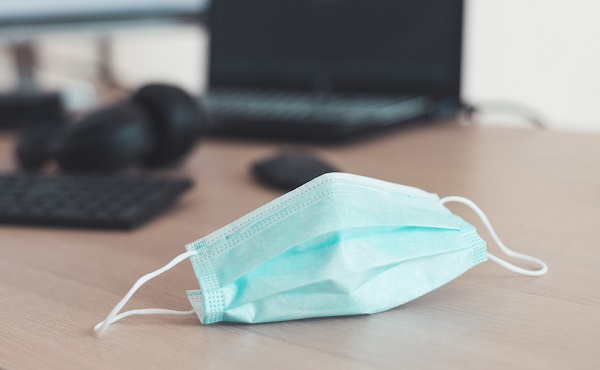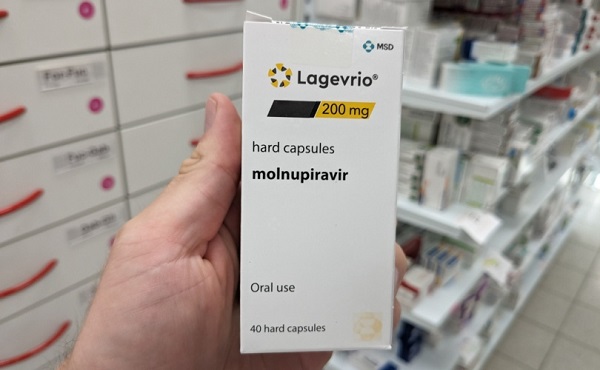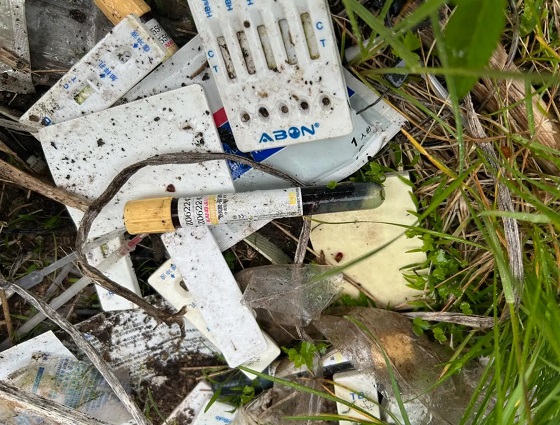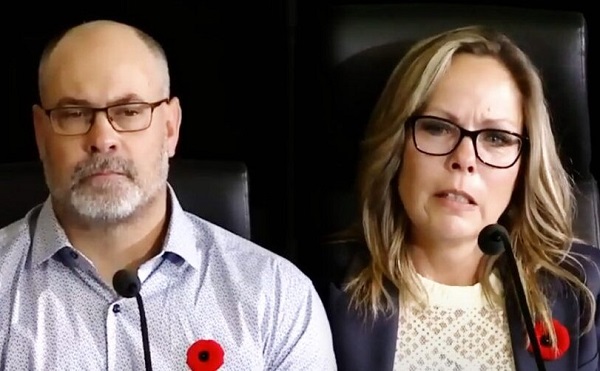COVID-19
Canadian judge rejects complaint against maskless workplaces as frivolous

From LifeSiteNews
Federal Court Justice Benoit Duchesne ruled that Elections Canada manager Nicolas Juzda’s complaint of feeling ‘unsafe’ following the end of mask mandates in federal workplaces was unreasonable
A federal judge ruled that complaints that maskless workplaces pose a danger to employees’ health are frivolous, ending the final chapter of COVID regulations.
According to information published on January 15 by Blacklock’s Reporter, Federal Court Justice Benoit Duchesne ruled that Elections Canada manager Nicolas Juzda’s complaint of feeling unsafe following the end of mask mandates in federal workplaces was unreasonable.
“The applicant’s concern about an unsafe workplace was based on his assessment that a significant number of people would return to the workplace under the return-to-work model, that any of these people may have contracted Covid-19 and that the non-mandatory recommendations and precautions relating to Covid-19 fell short of what he believes would be a safe work environment,” wrote the court.
Masks were mandated in federal workplaces from April 20, 2020, to February 14, 2023, under the direction of Prime Minister Justin Trudeau. At the same time, millions of Canadians were forced to mask in public settings such as grocery stores or hospitals.
After the mandate had lifted, Juzda, a “fully vaccinated” individual without any particular health issues, complained that he felt unsafe in the Gatineau headquarters.
“I must excuse my right to refuse work that constitutes a danger,” he wrote, referencing the Canada Labor Code that allows federally regulated staff to refuse work “that constitutes a danger to the employee.”
Juzda claimed that masking “reduces the risk of contracting Covid-19 but is of limited effectiveness if not combined with other measures, particularly during prolonged exposure to unmasked infected individuals such as being nearby in an indoor office for an entire day.”
“Covid-19 is a disease that in addition to often being extremely unpleasant during the acute period poses significant risks including death,” he continued.
“Handwashing and workplace cleaning are of minimal use in limiting the spread of Covid-19,” Juzda claimed.
His complaint was quickly dismissed as “frivolous” by executives, a move which Duchesne agreed with, calling Juzda’s concerns unwarranted.
Indeed, LifeSiteNews has reported extensively on overwhelming evidence showing that masks are ineffective in preventing transmission of COVID and that they come with harmful effects.
Back in 2021, 47 studies confirmed the ineffectiveness of masks for COVID, while 32 more confirmed their negative health effects.
According to another 2021 report, more than 170 studies have found that masks have been ineffective at stopping COVID and instead have been harmful, especially to children.
In fact, in 2020, before masks were widely mandated, Canada’s chief public health officer Dr. Theresa Tam admitted that masks were not effective in preventing COVID.
“There is no need to use a mask for well people,” she said in the first few weeks of the pandemic. “It hasn’t been proven really to protect you from getting the virus.”
COVID-19
WATCH: Big Pharma scientist admits COVID shot not ‘safe and effective’ to O’Keefe journalist

From LifeSiteNews
‘None of that stuff was safe and effective. We didn’t do the typical tests,’ Joshua Rys of Johnson & Johnson said to one of James O’Keefe’s undercover journalists.
A lead scientist for a global pharmaceutical firm disclosed on hidden camera that his firm’s COVID-19 vaccine underwent rushed testing, lacked research, and admitted that, in direct contradiction to the Biden administration’s constant refrain, the drug was not “safe and effective.”
“None of that stuff was safe and effective. We didn’t do the typical tests,” said Joshua Rys, a lead regulatory affairs scientist for Johnson & Johnson (J&J), not realizing that he was being filmed by one of James O’Keefe’s undercover journalists.
BREAKING: Johnson & Johnson Lead Scientist Confesses J&J COVID-19 Vaccine Was 'Not Safe and Effective,' Reveals “Lack of Research” From Rushing to Release Vaccine: “People Wanted It, We Gave It to Them”
“Do you have any idea the lack of research that was done on those products… pic.twitter.com/yEeyXy8toI
— James O'Keefe (@JamesOKeefeIII) July 15, 2025
Rys explained that normally a new drug undergoes an extended period of testing, including human trials, but the COVID-19 vaccine circumvented those safety measures in order to rush the product to the public.
“This was just, ‘Let’s test it on some lab-rat models, analyze and see if it works,” said Rys, “and just throw it to the wind and see what happens.”
“I’m sure somebody is going to get sued for that stuff, eventually,” he predicted.
“Do you have any idea [of] the lack of research that was done on those products?” asked the J&J lead scientist.
“People wanted it. We gave it to them,” said Rys.
O’Keefe later approached Rys to ask what led him to tell a total stranger that his product was not safe and effective, but Rys evaded O’Keefe and his probing.
O’Keefe explained that the work of his O’Keefe Media Group (OMG) undercover journalists is crucial because, he claimed, up to 80 percent of the revenue cable and other news organizations derive from ads comes from Big Pharma.
OMG is “pulling back the veil on the corruption and lies in our government, in our corporations, in the pharmaceutical industry,” said O’Keefe, ominously noting that the last time he did an investigation into Big Pharma organization Pfizer, he was indefinitely suspended from Project Veritas, the company he founded.
COVID-19
Japan disposes $1.6 billion worth of COVID drugs nobody used

From LifeSiteNews
The nation’s health ministry has already trashed 2 million doses of PaxlovidPACK and Lagevrio, and will dispose of 1.77 million doses of Xocova by the end of February 2026.
Japan is disposing of $1.6 billion worth of COVID-19 drugs that went unused and are now expired in a dramatic disconnect between government projections and reality.
The Japanese Broadcasting Corporation reported that the nation’s health ministry has already trashed 1.75 million patients’ worth of PaxlovidPACK and 780,000 patients’ worth of Lagevrio doses, and will dispose of 1.77 million patients’ worth of Xocova by the end of February 2026.
The government had been required by law to purchase enough oral COVID drugs for 5.6 million people, to be distributed free of charge through May 2023, at which point the virus was downgraded to the same threat level as normal seasonal influenza. But 2.5 million, a little under half the supply, remained unused by the time they hit their expiration dates.
The Star added that the value of the destroyed drugs is estimated to be roughly 240 billion yen, or 1.6 billion US dollars.
Across the world, governments took drastic action to counter the COVID pandemic, based in large part on exaggerated assumptions about the virus’s transmissibility and threat to non-elderly individuals without comorbidities. A large body of evidence has found that mass restrictions on personal and economic activity undertaken in 2020 and part of 2021 caused far more harm than good in terms of personal freedom and economics as well as public health, and that lives could have been saved through far less burdensome methods, such as the promotion of established therapeutic drugs, narrower protections focused on those most at risk (such as the elderly and infirm), and increasing vitamin D intake.
In Florida, the first report by a grand jury impaneled by Republican Gov. Ron DeSantis determined that lockdowns did more harm than good, that masks were ineffective at stopping COVID transmission, that COVID was “statistically almost harmless” to children and most adults, and that it is “highly likely” that COVID hospitalization numbers were inflated.
Much like the controversial COVID vaccines, concerns were raised about the safety and effectiveness of COVID therapeutics such as Paxlovid and Lagevrio as well.
In May, former Japanese minister of internal affairs and communications Kazuhiro Haraguchi announced he had cancer, and said testing of the lesions linked it to spike proteins from the COVID-19 vaccine he had received two years before.
-

 Energy2 days ago
Energy2 days agoIs The Carney Government Making Canadian Energy More “Investible”?
-

 Business2 days ago
Business2 days agoCompetition Bureau is right—Canada should open up competition in the air
-

 Immigration2 days ago
Immigration2 days agoUnregulated medical procedures? Price Edward Islanders Want Answers After Finding Biomedical Waste From PRC-Linked Monasteries
-

 Business2 days ago
Business2 days agoDemocracy Watchdog Says PM Carney’s “Ethics Screen” Actually “Hides His Participation” In Conflicted Investments
-

 Business2 days ago
Business2 days agoIt’s Time To End Canada’s Protectionist Supply Management Regime
-

 COVID-192 days ago
COVID-192 days agoFreedom Convoy leaders’ sentencing hearing to begin July 23 with verdict due in August
-

 Bruce Dowbiggin19 hours ago
Bruce Dowbiggin19 hours agoHow Did PEI Become A Forward Branch Plant For Xi’s China?
-

 COVID-1918 hours ago
COVID-1918 hours agoJapan disposes $1.6 billion worth of COVID drugs nobody used






